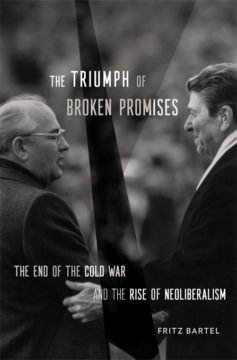 Max Krahé in Phenomenal World:
Max Krahé in Phenomenal World:
The Triumph of Broken Promises by Fritz Bartel is a new history of the end of the Cold War. Challenging conventional narratives that focus on Reagan’s military-ideological assertiveness or Gorbachev’s openness to reform, the book gives a material and structural explanation of Western victory and Eastern defeat.1 This makes for fascinating history: finance and energy emerge as silent but vital battlegrounds, unlikely connections—like those between Japanese investors and Hungarian central bankers—come to the fore, and several East-West similarities surprise the reader.
More than just fascinating history, however, the book makes a profound theoretical contribution. It demonstrates the importance of two institutional features of democratic capitalism, which state socialism lacked: the polity-economy distinction and competitive elections. It also highlights the importance of neoliberal ideology, providing certain Western policymakers with a framework to justify and even praise the unraveling of social democratic Keynesianism, while Eastern leaders struggled in vain to legitimize a similar turn to austerity within state socialism.
These features help explain why the West won the Cold War, and why this victory coincided with–and was in part fueled by—the rise of neoliberalism. In tracing their impact, the book also speaks to a set of wider questions: what is the nature of capitalism’s recent crises? What are the implications for progressive politics today? And is capitalism vs. socialism even the most useful framework for discussing these questions?
More here.
